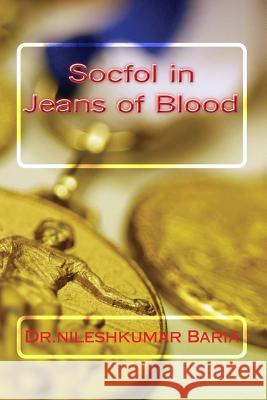Socfol in Jeans of Blood » książka
Socfol in Jeans of Blood
ISBN-13: 9781539477839 / Angielski / Miękka / 2016 / 294 str.
Football has usually been compared to a mirror of society, however this image is dishonest .Rather than reflective society because it is, it offers to people and teams a type of expression for their hopes and dreams. soccer has the power to transcend variations aged, gender, culture, religion, and socio-economic. The broad diversity of backgrounds of soccer players represents tangible illustration of civil rights and meritocracy. the game itself hasteam commonality, truthful play and mutual respect among members and for opponents implanted within its rules and practices. Yet, this sport known as the 'beautiful game' imbeds a contradiction. soccer is additionally a game which will vaguely check a simulacrum of war, wherever 2 groups face one another during a struggle with the noisy and emphatic support of the spectators. supported the logic of this game disposition, antagonism between 'them' and 'us', square measure essential. This setting naturally produces a need by supporters to intimidate the opposite aspect by encouraging their team and demonstrating, often exuberantly, through their words and actions each confidence and superiority. once the 'us' and 'them' opposition turns into symbolic exclusion of others, language of disparagementand insult supported racism or discrimination, or maybe physical confrontation, the 'beautiful game' is debased. The existence of racism and discrimination in soccer isn't a secret, however it's a shame on the game. though abundant is already being done, each observers and specialists feel too severalproblems persist and measures to tackle them haven't been effective enough. This report was commissioned by UN agency among the framework of UNESCO's partnership with Juventus FC. It focuses on discrimination and racism in football and to some extent the amateur clubs that funnel into the leagues. It provides an outline of the historic and theoretical background. It reports on the state of affairs on the bottom. It summarizes what has been done and is being done to mitigate racism and discrimination in domestic and international soccer, however the results of those actions is also evaluated, and which new avenues for additional, complementary action square measure promising. The report is predicated on a literature review, table analysis, regional reports from the UN agency network and a field survey among a purposive sample of specialists and actors during a range of states. The report encompasses a somewhat European focus, in its sources and examples. Europe encompasses a distinctive position within the world of soccer, with its leading competitions, championships and clubs. It is the region wherever racism and discrimination in soccer has been most intensively researched. A number of civil society organisations from Europe have contend a pioneering role within the fight against racism and discrimination in soccer. Moreover, the pressure that comes with the money invested with in and generated by western European soccer, yet as its exposure within the media, has additionally created clubs, federations and UEFA notably sensitive to the negative impact that discrimination will wear the sport and its image, among Europe and worldwide. Europe should so occupy a central role during a study of the fight against discrimination in football and in determined policies to mitigate racism and discrimination associated with soccer where they occur.The samples of incidents of discrimination and racism, yet as of existing measures to combat them are designated to be as wide-ranging as doable. The authors don't however, claim the report back to be a comprehensive listing. Similarly, the samples of best practice are collected through in depth reading and contacts, however should be checked out asan overview instead of as a directory. reading and contacts, however should be checked out asan overview instead of as a directory.
Zawartość książki może nie spełniać oczekiwań – reklamacje nie obejmują treści, która mogła nie być redakcyjnie ani merytorycznie opracowana.











